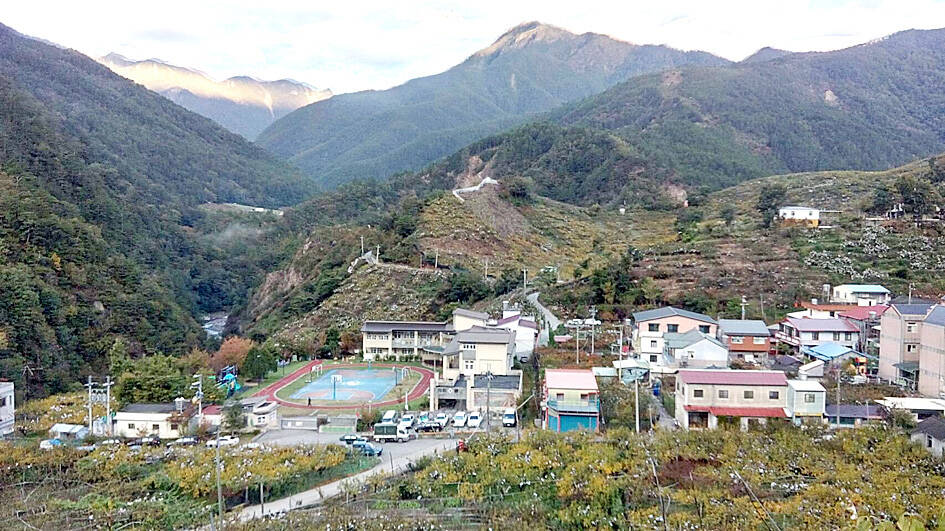An Atayal hunting trail on Taichung’s Wujiajianan Mountain (武加加難山) is to reopen in December after renovations are completed, the city’s Tourism and Travel Bureau said on Wednesday.
The bureau reported on the project’s progress during an inspection by Taichung Mayor Lu Shiow-yen (盧秀燕), who also visited healthcare workers in the Lishan (梨山) area to thank them for their work during the COVID-19 pandemic.
Using NT$59 million (US$1.91 million) in funding from the central government, the bureau is updating and expanding the 2.5km trail, which has historically been used for hunting by residents of the Atayal village of Sqoyaw (Huanshan, 環山).

Photo: Chang Hsuan-che, Taipei Times
Work is expected to finish by the end of the year, it said.
The ancient hunting trail is being renovated with a focus on sustainability and reducing the use of artificial construction materials, the bureau said.
In addition to rest areas, informational placards are to be posted telling the oral histories of Sqoyaw residents, it said.
The stories would describe traditional hunting practices, and introduce locations such as an archery practice area and village remains, it said.
The trail is to serve as a destination for tourists and a resource for residents to pass on their culture, the bureau said.
Liao Wei-chih (廖偉志), director of the bureau’s engineering division, said that the trail follows the original Atayal hunting path in a loop encircling Wujiajianan Mountain.
The trail section with the Sijielan River (司界蘭溪) suspension bridge might also be extended to connect to Sqoyaw village, making the hiking network in the Lishan area more complete, he added.
The renovation is part of wider efforts by the bureau to develop tourism opportunities in the Lishan area of the Central Mountain Range.
Plans also include a New Year’s Eve promotion, subsidies for tour groups and improvements to lodging, the bureau said.

The Ministry of Foreign Affairs (MOFA) yesterday voiced dissatisfaction with the Comprehensive and Progressive Agreement for Trans- Pacific Partnership (CPTPP), whose latest meeting, concluded earlier the same day, appeared not to address the country’s application. In a statement, MOFA said the CPTPP commission had "once again failed to fairly process Taiwan’s application," attributing the inaction to the bloc’s "succumbing to political pressure," without elaborating. Taiwan submitted its CPTPP application under the name "Separate Customs Territory of Taiwan, Penghu, Kinmen and Matsu" on Sept. 22, 2021 -- less than a week after China

THE GOOD WORD: More than 100 colleges on both sides of the Pacific will work together to bring students to Taiwan so they can learn Mandarin where it is spoken A total of 102 universities from Taiwan and the US are collaborating in a push to promote Taiwan as the first-choice place to learn Mandarin, with seven Mandarin learning centers stood up in the US to train and support teachers, the Foundation for International Cooperation in Higher Education of Taiwan (FICHET) said. At the annual convention of the American Council on the Teaching of Foreign Languages held over the weekend in New Orleans, Louisiana, a Taiwan Pavilion was jointly run by 17 representative teams from the FICHET, the Overseas Community Affairs Council, the Steering Committee for the Test of Proficiency-Huayu, the

A home-style restaurant opened by a Taiwanese woman in Quezon City in Metro Manila has been featured in the first-ever Michelin Guide honoring exceptional restaurants in the Philippines. The restaurant, Fong Wei Wu (豐味屋), was one of 74 eateries to receive a “Michelin Selected” honor in the guide, while one restaurant received two Michelin stars, eight received one star and 25 were awarded a “Bib Gourmand.” The guide, which was limited to restaurants in Metro Manila and Cebu, was published on Oct. 30. In an interview, Feng Wei Wu’s owner and chef, Linda, said that as a restaurateur in her 60s, receiving an

Kaohsiung Mayor Chen Chi-mai (陳其邁) on Monday announced light shows and themed traffic lights to welcome fans of South Korean pop group Twice to the port city. The group is to play Kaohsiung on Saturday as part of its “This Is For” world tour. It would be the group’s first performance in Taiwan since its debut 10 years ago. The all-female group consists of five South Koreans, three Japanese and Tainan’s Chou Tzu-yu (周子瑜), the first Taiwan-born and raised member of a South Korean girl group. To promote the group’s arrival, the city has been holding a series of events, including a pop-up